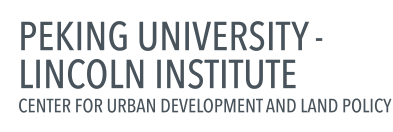RESEARCH
The Peking University-Lincoln Institute Center for Urban Development and Land Policy (PLC) focuses on five areas: property tax and local public finance, urban development and planning, land policy, housing policy, environmental policy and conservation. Through in depth cooperation with domestic and international researchers, scholars and government agencies, the PLC conducts policy research and academic exchanges, provides funding for the research and education opportunities, engages in capacity building and dissemination of research findings, and thus has provided strong scientific support for the institutional building of the Chinese urbanization process.

Fiscal Policy & Property Taxation
The PLC has been supporting Chinese government’s on-going effort to introduce property taxation and reform municipal finance. The PLC’s activities on property taxation include research, training, policy advisory, publications, and pilot demonstration projects in the areas of property tax law, property tax assessment and administration. The PLC also sponsors research on local public finance in China, including China’s fiscal structure and intergovernmental transfers, urban infrastructure finance, budget reform, local debts, land-based finance, and municipal fiscal sustainability.

Land Policy
China’s land policy is undergoing reform. As land policy is at the center of a number of urban and rural development issues, the reform of land management system and land rights is at the forefront of current policy debates. Through research and training, the PLC seeks to enhance the international and domestic knowledge of Chinese officials and scholars in land expropriation, land use efficiency, land-use planning, land conservation, property rights, and land-based finance. The PLC also supports policy evaluation of the on-going pilot experiments of land policy reform at the local level.

Housing Policy
China's rapid urbanization and rising housing prices have created unprecedented urban challenges to policy makers, planners, business firms, and ordinary households: for example, declining housing affordability, oversupply and vacancies, widened income and asset inequalities, and lack of access to social housing for migrant workers in the urban areas. In response, the PLC has initiated research that examines these issues by analyzing current conditions of urban housing markets and China's affordable housing policy. The PLC and the Hang Lung Center for Real Estate, Tsinghua University, jointly developed the China Quality-Controlled Urban Housing Price Index (CQCHPI), which is the first hedonic housing price index in China. The regular updates of the indices for a number of selected cities provide the up-to-date accurate information and analysis across local housing markets and help policy makers make better housing policy decisions.

Urban Development & Planning
As China’s urban population reaches 56 percent of the total population, municipal governments and planners face massive challenges in urban development and planning. The PLC has supported a number of studies on planning laws, smart growth, land use and transport, urban air quality, and urban agglomerations. As private property rights are being strengthened both in urban and rural areas, the PLC plays an active role in advancing the knowledge and understanding of “planning, law, and property rights.”

Urban Policy & Sustainable Development
The environmental degradation amid rapid urbanization in China has been an issue that has garnered avid international attention in recent years. Today there is a broad consensus that achieving environmental goals requires a broad array of better fiscal, urban, and land policies. The PLC supports research on these topics, bringing together scholars and officials to discuss China’s sustainable development and environmental policy. In addition, the PLC works in collaboration with its partnering institutions in China and has recently initiated policy research work on environmental conservation for Chinese cities.

